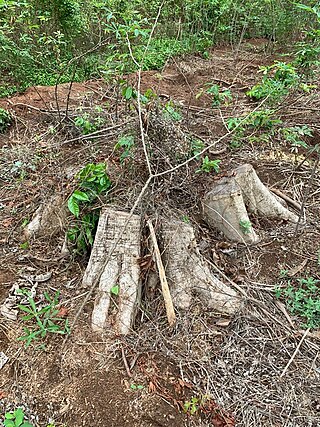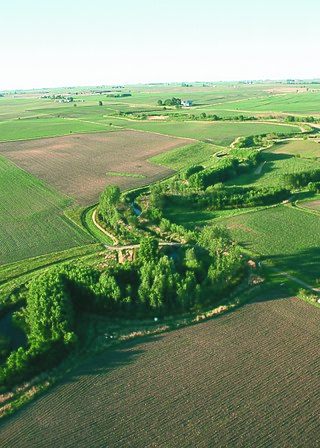
Reforestation is the practice of restoring previously existing forests and woodlands that have been destroyed or damaged. The prior forest destruction might have happened through deforestation, clearcutting or wildfires. Three important purposes of reforestation programs are for harvesting of wood, for climate change mitigation, and for ecosystem and habitat restoration purposes. One method of reforestation is to establish tree plantations, also called plantation forests. They cover about 131 million ha worldwide, which is 3% of the global forest area and 45% of the total area of planted forests.

The Global Environment Facility (GEF) is a multilateral environmental fund that provides grants and blended finance for projects related to biodiversity, climate change, international waters, land degradation, persistent organic pollutants (POPs), mercury, sustainable forest management, food security, and sustainable cities in developing countries and countries with economies in transition. It is the largest source of multilateral funding for biodiversity globally and distributes more than $1 billion a year on average to address inter-related environmental challenges.
The Green Belt Movement (GBM) is an indigenous grassroots organization in Kenya that empowers women through the planting of trees. It is one of the most effective and well-known grassroots organisations addressing the problem of global deforestation. Professor Wangari Maathai established the organization in 1977 under the auspices of the National Council of Women of Kenya (NCWK). GBM's successes in forest conservation, education, and women's economic empowerment have gained the organisation worldwide acclaim. It is also noted for its advocacy of human rights, democratisation of access to public lands, and environmental justice issues such as the role of women's traditional ecological knowledge in addressing environmental degradation and desertification.

The Center for International Forestry Research (CIFOR) is a non-profit scientific research organization that conducts research on the use and management of forests with a focus on tropical forests in developing countries. CIFOR, which merged with World Agroforestry on Jan. 1, 2019, is the forestry and agroforestry research center of CGIAR, a network of 15 research centers around the world that focus on agricultural research for sustainable development, working closely with governments and other partners to help develop evidence-based solutions to problems related to sustainable agriculture and natural resource management.
The Ministry for the Environment is the public service department of New Zealand charged with advising the New Zealand Government on policies and issues affecting the environment, in addition to the relevant environmental laws and standards. The Environment Act 1986 is the statute that establishes the Ministry.
Environmental issues in Pakistan include air pollution, water pollution, noise pollution, climate change, pesticide misuse, soil erosion, natural disasters, desertification and flooding. According to the 2020 edition of the environmental performance index (EPI) ranking released by Yale Center for Environmental Law & Policy, Pakistan ranks 142 with an EPI score of 33.1, an increase of 6.1 over a 10-year period. It ranked 180 in terms of air quality. The climatic changes and global warming are the most alarming issues risking millions of lives across the country. The major reasons of these environmental issues are carbon emissions, population explosion, and deforestation.

Forest management is a branch of forestry concerned with overall administrative, legal, economic, and social aspects, as well as scientific and technical aspects, such as silviculture, forest protection, and forest regulation. This includes management for timber, aesthetics, recreation, urban values, water, wildlife, inland and nearshore fisheries, wood products, plant genetic resources, and other forest resource values. Management objectives can be for conservation, utilisation, or a mixture of the two. Techniques include timber extraction, planting and replanting of different species, building and maintenance of roads and pathways through forests, and preventing fire.

The Sustainable Forestry Initiative (SFI) is a sustainability organization operating in the U.S. and Canada that works across four pillars: standards, conservation, community, and education. SFI was founded in 1994 by the American Forest & Paper Association (AF&PA). SFI is the world's largest single forest certification standard by area. SFI is headquartered in Ottawa and Washington, D.C.

The extensive and rapid clearing of forests (deforestation) within the borders of Nigeria has significant impacts on both local and global scales.
Akure Forest Reserve is a protected area in southwest Nigeria, covering 66 km2 (25 sq mi). The Akure Forest Reserve, established in 1948 and spanning approximately 32 hectares. It was created with the primary aim of safeguarding the genetic diversity of the forest ecosystem. About 11.73% (8.2 km2) is estimated to be cleared for cocoa farming and other food crops. Aponmu and Owena Yoruba speaking communities owned the forest, though, there are also minor settlements surrounding the forest. They include Ipogun, Kajola/ Aponmu, Kajola, Ago Petesi, Akika Camp, Owena Town, Ibutitan/Ilaro Camp, Elemo Igbara Oke Camp and Owena Water new Dam.
Cuba possesses a diverse range of natural habitats, housing a wide variety of species, including many endangered ones. However, the country has faced environmental challenges, particularly deforestation, since the arrival of European settlers. Forest areas have been cleared for agricultural purposes, leading to the loss of forests and the extinction of certain species. The cutting down of trees for fuel and construction materials has further contributed to this issue.

The Ministry of Environment and Climate Change is a cabinet-level federal ministry in Brazil. The ministry emerged from the Special Secretariat for the Environment within the now-extinct Ministry of the Interior from 1974 to 1985. It has gone through several name changes since its inception.

Nature-based solutions describe the development and use of nature (biodiversity) and natural processes to address diverse socio-environmental issues. These issues include climate change mitigation and adaptation, human security issues such as water security and food security, and disaster risk reduction. The aim is that resilient ecosystems provide solutions for the benefit of both societies and biodiversity. The 2019 UN Climate Action Summit highlighted nature-based solutions as an effective method to combat climate change. For example, nature-based systems for climate change adaptation can include natural flood management, restoring natural coastal defences, and providing local cooling.

Climate change education (CCE) is education that aims to address and develop effective responses to climate change. It helps learners understand the causes and consequences of climate change, prepares them to live with the impacts of climate change and empowers learners to take appropriate actions to adopt more sustainable lifestyles. Climate change and climate change education are global challenges that can be anchored in the curriculum in order to provide local learning and widen up mindset shifts on how climate change can be mitigated. In such as case CCE is more than climate change literacy but understanding ways of dealing with climate

Climate change in Tanzania is affecting the natural environment and residents of Tanzania. Temperatures in Tanzania are rising with a higher likelihood of intense rainfall events and of dry spells.

Due to its geographical and natural diversity, Indonesia is one of the countries most susceptible to the impacts of climate change. This is supported by the fact that Jakarta has been listed as the world's most vulnerable city, regarding climate change. It is also a major contributor as of the countries that has contributed most to greenhouse gas emissions due to its high rate of deforestation and reliance on coal power.

Environment and Ecology Bureau is a policy bureau of the Government of Hong Kong. The agency was established on 1 July 2022. The current Secretary for Environment and Ecology is Tse Chin-wan.

The National Identification and Registration Authority is a governmental agency in Somalia, established under the Identification and Registration of Act.
Nature-positive is a concept and goal to halt and reverse nature loss by 2030, and to achieve full nature recovery by 2050. According to the World Wide Fund for Nature, the aim is to achieve this through "measurable gains in the health, abundance, diversity, and resilience of species, ecosystems, and natural processes." Progress towards this goal is generally measured from a biodiversity baseline of 2020 levels.

Rwanda has made significant strides in developing a legal framework to protect the environment, promote sustainable land use, and ensure community participation. The country's commitment to environmental protection is evident in its comprehensive laws, policies, and institutional frameworks. Rwanda's legal framework for environmental protection is comprehensive. By integrating environmental considerations into national laws, policies, and institutional frameworks, Rwanda is ensuring a sustainable future for its citizens. Community participation is a key component of this framework, empowering citizens to contribute to environmental protection and sustainable land use.












